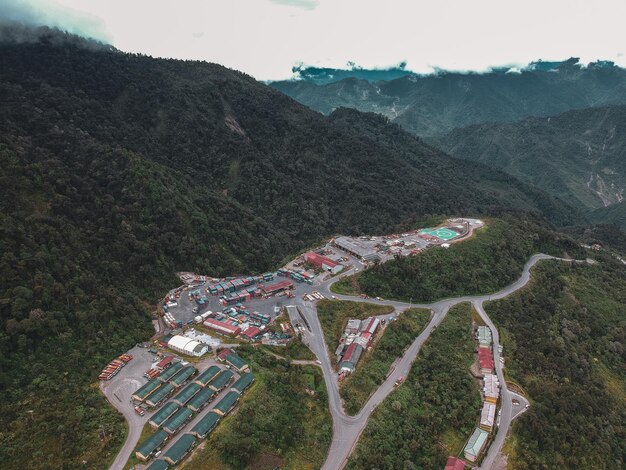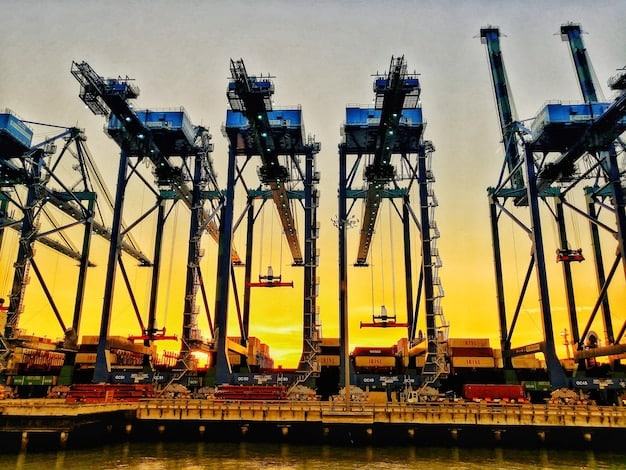Maximize Profits: A US Company’s Guide to Peru’s Free Trade Zones

Unlocking the potential of Peru’s Free Trade Zones (FTZs) can significantly benefit US companies by providing tax exemptions, streamlined customs procedures, and access to a growing market, enabling enhanced competitiveness and profitability through strategic international expansion.
Are you looking to expand your business internationally and tap into new markets? Peru’s Free Trade Zones (FTZs) offer a compelling opportunity for US companies seeking to enhance profitability and competitiveness. This guide provides a step-by-step approach to how US companies can benefit from Peru’s Free Trade Zones: A Step-by-Step Guide, outlining the key advantages and processes involved.
Understanding Peru’s Free Trade Zones
Peru’s Free Trade Zones (FTZs), known locally as Zonas Francas, are designated areas within the country that offer unique incentives to attract foreign investment. These zones are designed to promote economic development by providing a favorable environment for companies engaged in manufacturing, logistics, and other value-added activities. Understanding the basics of these zones is the first step toward leveraging their benefits.
Key Features of Peruvian FTZs
Peruvian FTZs offer a range of benefits designed to lower operational costs and enhance export capabilities. These features include tax exemptions, simplified customs procedures, and access to vital infrastructure.
- Tax Exemptions: Companies operating within FTZs are generally exempt from import duties, VAT (Value Added Tax), and other local taxes, significantly reducing their tax burden.
- Simplified Customs Procedures: FTZs offer streamlined customs processes, reducing administrative delays and costs associated with importing and exporting goods.
- Strategic Location: Peru’s FTZs are strategically located to provide easy access to both domestic and international markets, facilitating efficient supply chain management.
These features make Peru’s FTZs attractive to US companies seeking to optimize their global operations and improve their bottom line. The strategic advantages of operating within these zones can translate into substantial cost savings and competitive advantages.

Benefits for US Companies Investing in Peruvian FTZs
Investing in Peru’s Free Trade Zones can bring a wealth of advantages for US companies. From tax incentives to access to new markets, the benefits are significant and varied.
Tax Advantages
One of the most compelling reasons for US companies to invest in Peruvian FTZs is the array of tax benefits. These can dramatically reduce operational costs and boost profitability.
- Exemption from Import Duties: Eliminates costs associated with importing raw materials and equipment.
- VAT Exemption: Provides significant savings on the value-added tax applied to goods and services.
- Income Tax Reductions: Some FTZs offer further reductions in income tax rates, enhancing overall profitability.
The tax advantages alone can make a compelling case for US companies to consider establishing operations in Peru’s FTZs. Combined with other incentives, these tax breaks can significantly improve a company’s financial performance.
Step-by-Step Guide: Setting Up Operations in Peru’s FTZs
Navigating the process to set up operations in Peru’s FTZs can seem complex. However, following a structured approach can simplify the procedure and ensure a smooth transition.
Step 1: Initial Assessment and Planning
The first step involves conducting a thorough assessment of your company’s needs and objectives. This includes identifying the specific benefits that Peru’s FTZs offer and how they align with your business goals.
Begin by researching the various FTZs available in Peru. Each zone may have specific focuses or advantages that are more suitable for certain industries or business models. Consider your company’s operational requirements and identify the zone that best matches those needs.
Step 2: Legal and Regulatory Compliance
Ensuring compliance with Peruvian laws and regulations is crucial for establishing operations in an FTZ. Consult with legal experts who are familiar with Peruvian business law.
- Registering Your Business: The process typically involves registering with the relevant Peruvian authorities, such as SUNAT (the national tax administration).
- Obtaining Necessary Permits: You will need to secure all necessary permits and licenses required to operate in the FTZ, which may vary depending on the zone and your industry.
- Adhering to Labor Laws: Comply with Peruvian labor laws, including regulations related to employment contracts, working hours, and employee benefits.
Proper legal and regulatory compliance ensures that your company operates smoothly within the FTZ and avoids potential legal issues in the future. Engage with local legal professionals to navigate these complexities effectively.
Choosing the Right Free Trade Zone in Peru
Selecting the right Free Trade Zone is crucial for maximizing the benefits and ensuring that the location aligns with your business objectives. Several factors need to be considered to make an informed decision.
Factors to Consider
When choosing a Free Trade Zone in Peru, evaluate aspects like location, infrastructure, and the types of industries the zone caters to.
- Location: Evaluate the proximity to ports, airports, and major transportation routes to ensure efficient logistics.
- Infrastructure: Assess the availability of reliable utilities, such as power, water, and internet connectivity.
- Industry Focus: Choose a zone that aligns with your industry to leverage specialized services and potential collaborations.
Careful consideration of these factors will help you identify the Free Trade Zone that best supports your business operations and strategic goals. It’s important to align the zone’s characteristics with your company’s specific needs to ensure long-term success.

Financing and Investment Opportunities
There are several financing and investment opportunities available for US companies looking to invest in Peru’s Free Trade Zones. Understanding these options is crucial for securing the necessary capital to establish and grow your operations.
Sources of Funding
Explore various funding sources, including local banks, international financial institutions, and government incentives, to support your investment in Peruvian FTZs.
Local Peruvian banks offer a range of financial products tailored to businesses operating in FTZs. These may include loans, credit lines, and trade finance solutions designed to meet the specific needs of companies engaged in international trade and manufacturing.
International financial institutions, such as the World Bank and the Inter-American Development Bank, also provide financing options for projects in developing countries, including Peru. These institutions often offer competitive interest rates and favorable repayment terms to encourage foreign investment.
Navigating Cultural and Business Practices in Peru
Successfully operating in Peru requires an understanding of local cultural and business practices. Building strong relationships and adapting to local customs can significantly enhance your business operations.
Understanding Peruvian Business Culture
Becoming familiar with Peruvian business etiquette, communication styles, and negotiation tactics is vital for successful partnerships and collaborations.
Peruvians often value personal relationships in business. Taking the time to build rapport and establish trust is essential for fostering long-term partnerships. This may involve spending time socializing and getting to know your Peruvian counterparts on a personal level.
Effective communication is also key. While many Peruvian business professionals speak English, demonstrating an effort to learn and use Spanish can be highly appreciated. Clear and respectful communication, free of jargon or overly direct language, will help avoid misunderstandings and build stronger relationships.
| Key Highlights | Brief Description |
|---|---|
| 💰 Tax Benefits | Enjoy exemptions from import duties and VAT, reducing operational costs. |
| 🗺️ Strategic Location | Gain access to both domestic and international markets. |
| 📜 Compliance | Adhere to legal and regulatory standards to secure operations. |
| 🤝 Cultural Integration | Adapt to Peruvian business culture for stronger relationships. |
Frequently Asked Questions (FAQ)
Peru’s FTZs offer tax exemptions, streamlined customs, and strategic locations, boosting competitiveness and profitability for US companies. These advantages provide a solid foundation for international expansion.
Consider factors like location, industry focus, and infrastructure. Align these elements with your business needs to ensure the optimal fit for your operational requirements and long-term goals.
Exemptions include import duties, VAT, and potential income tax reductions. These significantly decrease operational costs, enhancing your company’s overall financial performance and investment returns.
Begin with an assessment, ensure compliance, and secure needed permits. Partnering with local experts is essential for smoothly navigating legal and regulatory landscapes.
It’s crucial. Building trust, understanding protocols, and communicating effectively can establish strong partnerships. Respecting local customs will foster enhanced business relations.
Conclusion
Peru’s Free Trade Zones present significant opportunities for US companies seeking to expand their global footprint. By leveraging the benefits of these zones, businesses can significantly reduce costs, access new markets, and enhance their overall competitiveness. With careful planning and a strategic approach, US companies can unlock the full potential of investing in Peru’s thriving economy.





